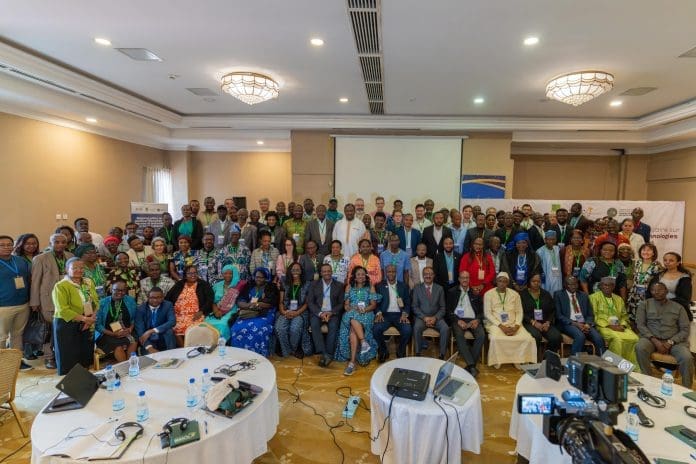Over 130 participants from 33 African countries have issued a stark warning about emerging technologies in agriculture, declaring that artificial intelligence (AI), synthetic biology, and digital platforms threaten to replicate colonial patterns of extraction unless Africa maintains control over its food systems and data.
The Pan-African Declaration on the Future of Biodigital Technologies in Food and Agriculture emerged from a landmark three-day convening in Addis Ababa, Ethiopia, from October 2 to 4, 2025. Co-organized by the Alliance for Food Sovereignty in Africa (AFSA), African Technology Assessment Platform (AfriTAP), and the ETC Group, the gathering brought together farmers, pastoralists, fisherfolk, scientists, policymakers, and civil society organizations to confront what they described as a new wave of technological colonialism.
“Technologies are not neutral; they reflect and reproduce systems of power,” the declaration states bluntly. “Artificial intelligence industry is emerging as an imperial force. Africa must not be a testing ground for corporate-driven biodigitalization.”
The document warns that the convergence of biology and digital technologies, including AI, robotics, genomics, lab-grown proteins, 3D printed foods, and geoengineering, represents a “new conjunction of technological, geopolitical, and epistemic power” that could deepen existing inequalities across the continent.
Hakim Baliraine, Chairperson of AFSA, emphasized the urgency of ensuring food sovereignty that reflects Africa’s cultural and ecological heritage. Speaking at the convening’s opening, he argued that imposed technologies have historically facilitated resource extraction, from colonial cash crop economies through the Green Revolution to contemporary mineral mining fueling the AI boom.
The declaration identifies specific threats facing African agriculture: corporate capture of genetic resources and data, ecological exploitation, massive energy and water consumption with serious climate emissions, increased government surveillance, land and water grabs, deskilling of small farmers, vulnerability of traditional and indigenous knowledge, and exclusion of women and youth from decision-making.
Participants raised particular concern about what they termed “biopiracy 2.0,” referring to the digitization and patenting of indigenous seeds and livestock genetics. They also warned about digital credit platforms turning farmers into “digital sharecroppers” trapped in debt cycles and dependency.
The conference discussions exposed how AI and digital platforms operating in African agriculture often replicate colonial extraction patterns. Africa’s mineral resources are being expropriated to fuel AI development, dispossessing farmers and communities while leaving lands and water polluted. Warnings centered on ecological costs of massive data centers, environmental justice impacts of mining, and surveillance risks via biometric-based subsidy programs.
However, the declaration doesn’t reject technology entirely. “We recognize that digital technologies hold opportunities to connect movements, strengthen local and territorial markets, and support farmer-to-farmer knowledge sharing,” participants acknowledged. “However, we challenge the narrative that digitalization technologies are a silver bullet.”
Instead, the document insists that emerging technologies should only be deployed where they advance food sovereignty and agroecology, which “must be the foundation of Africa’s future in a digital era.” Technologies must be non-extractive, co-created with communities, and firmly anchored in human rights, the declaration states.
The call to action targets multiple stakeholders. African governments are urged to develop policies supporting agroecological food systems, ensure farmer privacy and control over farm data, protect plant genetic resources, provide transparency about private sector partnerships, and include marginalized groups like youth and women in digitalization decisions.
The African Union (AU) and regional bodies face calls to integrate agroecology into continental strategies, develop digital governance frameworks rooted in the African Charter on Human and People’s Rights and other international instruments, ensure Africa’s digital sovereignty through continental infrastructure, and revise biosafety frameworks to account for risks from new technologies converging with AI.
Civil society organizations received their own marching orders: create awareness of digital technology harms, strengthen participation in technology assessment platforms, promote grassroots innovation and farmer-led seed banks, build collective power against harmful technologies, and develop advocacy at local, national, and regional levels for data protection frameworks.
Notably, the declaration includes full support for the July 2025 decision by African ministers at the African Ministerial Conference on the Environment (AMCEN20) to reject solar geoengineering and call for an international non-use agreement banning deployment, public funding, outdoor experimentation, patenting, or support for such technologies.
Corporations, philanthropies, and international institutions are told simply to respect Africa’s sovereignty and support people-centered, agroecological alternatives.
Seyoum Mekonen, Ethiopia’s State Minister of Planning and Development, offered a contrasting perspective at the conference, emphasizing that harnessing biodigital technologies is key to ensuring food sovereignty. He noted the paradox that despite holding over 60 percent of the world’s uncultivated arable land, Africa remains a net food importer, a situation he argued must be addressed through technology-driven solutions.
That tension between embracing digital transformation and resisting corporate capture defined the convening. Participants ultimately landed on a position demanding African control over technological deployment rather than blanket rejection.
The declaration closes by calling on all participants and allies to endorse the document, amplify its vision, and carry its commitments forward “as a living roadmap for Africa’s digital future.” Whether that roadmap gains traction among African governments navigating pressure from technology companies and development partners remains to be seen.
Source: newsghana.com.gh











